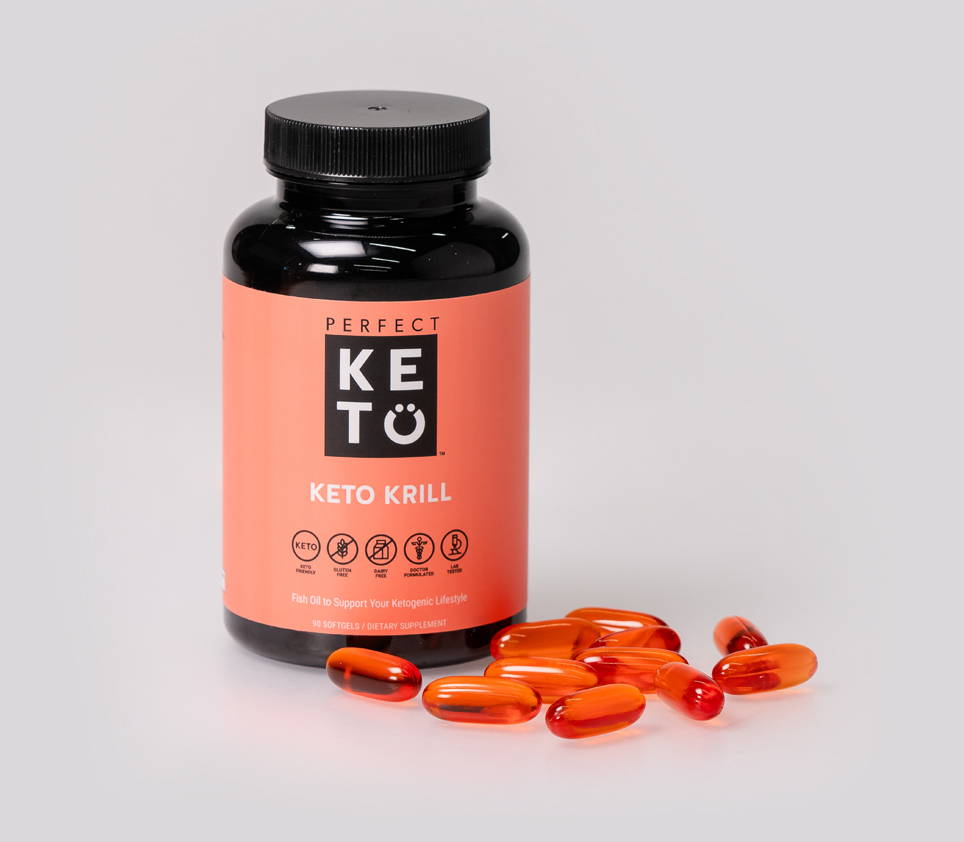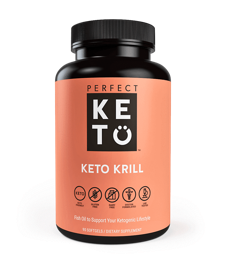5 Things to Know About Keto Krill
- Boosted with MCTs: Keto Krill is the only krill oil on the market made with MCT oil, a keto-friendly fat.
- Free from heavy metals: Keto Krill is rigorously tested for heavy metals and other common contaminants found in some krill and fish oils, like mercury. Krill oil also naturally has a lower accumulation of toxins and metals, compared to fish oil.
- Heat-free extraction: Keto Krill is made using a patented cold vacuum process that protects the oil from degradation and helps maintain nutrient quality.
- Keto-friendly ingredients: You won’t find any hidden sugars or carbs that could kick you out of ketosis.
- Free from junk: Keto Krill is GMO-free and doesn’t contain any chemical fillers or artificial ingredients.
What is Krill Used For?
Krill oil contains the same critical omega-3 fatty acids of fish oil, but with additional antioxidants and phospholipid compounds that may make it superior.
#1: Cardiovascular Health
Like fish oil, krill oil may improve cardiovascular health by lowering inflammatory markers and improving cholesterol markers. Krill oil may increase beneficial HDL levels and help lower triglycerides[*][*][*][*].
#2: Inflammation
Krill oil also has two key ingredients that may have anti-inflammatory benefits: omega-3 fatty acids and the antioxidant astaxanthin.
Omega-3 fatty acids are a type of polyunsaturated fat — the same kind found in keto-friendly foods like walnuts, flaxseeds, and fatty fish.
The most bioavailable omega-3s are eicosapentaenoic acid (EPA) and docosahexaenoic acid (DHA).
These important omega-3s play an essential role in protecting your cells, immune system, lungs, heart, blood vessels, and endocrine system.
Krill oil is also packed with the powerful antioxidant astaxanthin — a compound you won’t find in fish oil — which can help protect against oxidative stress and damage[*][*][*][*].
#3: Joint Pain
Krill oil may help ease joint pain.
Studies show that just 2 grams of krill oil per day for 30 days may improve mild knee pain in adults[*].
And that 300 mg per day for just 7 days can reduce inflammatory markers in patients suffering from rheumatoid arthritis or osteoarthritis.
What is Krill Made From?
Keto Krill is sourced from Antarctic kill, which are rich in omega-3 fats and antioxidants.
It’s also free from genetically modified organisms (GMOs) and tested for heavy metals and other contaminants.
Each Keto Krill capsule contains:
- 350mg of krill oil
- 52mg of EPA
- 24g of DHA
- 96mg of phospholipids
- 29mg of astaxanthin
Unlike other krill or fish oil supplements, you’ll also find 650 mg of keto-friendly MCT oil in every capsule.
Krill Oil vs Fish Oil
What’s the difference between taking krill oil and fish oil?
Krill Is Lower On The Food Chain
First, krill oil is sourced from Antarctic Krill, which are small crustaceans at the bottom of the ocean’s food chain. That means lower levels of toxins like mercury.
Fish oil, on the other hand, comes from fatty fish like salmon or trout, a bit higher on the food chain. The higher a fish is on the food chain, the higher the bioaccumulation of mercury.
Nutrient Load
Krill oil takes the lead over fish oil when it comes to additional nutrients.
In addition to containing meaningful amounts of the active omega-3s EPA and DHA, krill oil contains phospholipids and astaxanthin.
Phospholipids offer brain and cellular health benefits, including protecting cell membranes, thanks to their anti-inflammatory and antioxidant properties[*][*][*][*].
And astaxanthin is a powerful antioxidant that may protect your brain, eyes, and skin[*].
These additional nutrients mean that krill oil has a higher bioavailability,which means a lower dose of krill oil has equivalent effects of a higher dose of fish oil[*][*].
EPA and DHA Levels
One of the biggest differences between krill oil and fish oil comes down to their respective EPA and DHA levels.
Krill oil supplements contain far less EPA + DHA, 45- 200 mg per softgel, compared to 300-2,250mg per softgel or teaspoon of fish oil.
But, here’s where the real difference comes in.
The type of fat within these two oils varies in that the EPA and DHA in krill oil is primarily incorporated in phospholipids while fish oil is in triglycerides or ethyl esters.
Because of this key difference, krill oil may have a superior bioavailability (it may be absorbed better).
Current studies suggest:
- Krill oil may be more bioavailable but more research is needed [*]
- Krill oil is the better option for increasing EPA + DHA levels while simultaneously lowering omega-6:omega-3 fatty acid ratio [*]
- Krill oil led to significantly greater increases in plasma EPA + DHA [*]
- Krill oil is a safe and comparable alternative for people who don’t like fish or fish supplements [*]
Types of Supplements
Fish oil is also available in either softgel or liquid forms while krill oil only comes as a softgel.
Krill oil supplements come in a smaller capsule than fish oil,
Larger fish oil pill size can contribute to “fishy” smelling burps.
Fish oil is often cheaper than krill oil.
What Makes Perfect Keto Krill Different?
Keto Krill is not just another krill oil on the market. Keto Krill contains additional keto-friendly ingredients and adheres to strict processing methods for a krill oil that supports your healthy keto lifestyle.
#1: Contains High-Quality MCTs
Keto Krill is the only krill oil that also contains rapidly-digesting MCT oil from coconuts.
These shorter chain fats, also known as medium chain triglycerides, are quickly absorbed and used by your body for energy. Although 650 mg of MCTs isn’t enough to boost your energy levels, MCTs may contribute to better absorption of the nutrients in your krill oil.
#2: Unique Extraction Process
Keto Krill uses a patented cold vacuum process that protects the oil from degradation and helps maintain nutrient quality.
This keeps the oil stable and ensures that it all omega-3 fats and antioxidants remain as potent as possible, even after processing.
#3: No Artificial Ingredients or Cheap Fillers
All of our Perfect Keto products are free from chemicals, fillers,GMOs, and artificial flavors — and Keto Krill is no different.
All Keto Krill is also rigorously tested to ensure it’s free from heavy metals and other toxic compounds.
How to Use Krill
Keto Krill is best taken with food and plenty of water. You can take anywhere from 2-6 capsules per day, depending on your specific needs.
You can take Keto Krill anytime of the day just as long as you take it with food.
So you can:
- Add it to your morning breakfast
- Take it after a workout while you sip on a protein shake
- Bring it with you to work to have with lunch
- Enjoy it with dinner
With no fishy aftertaste, you can take krill oil anytime of day.
Keto Krill also works well when combined with other Perfect Keto favorites.
How Keto Krill Works With Other Perfect Keto Favorites
You can safely take Keto Krill with any of our products.
We’ve found it works best with:
- Collagen + Krill: May help reduce inflammation and improve recovery.
- Krill + Whey: May help with muscle recovery.
- Krill + MCT Oil or Powder: For clean energy throughout your day.
Who Should Use Keto Krill?
Similar to fish oil, Keto Krill is safe for most people to take and supports a healthy ketogenic diet or carnivore diet.
Athletes or regular gym goers may also benefit from krill oil, which may help with muscle recovery.
Those who are concerned with brain health, cognitive function, systemic inflammation, PMS, or autoimmune disease symptoms may also benefit from regular krill oil supplementation.
How Does Krill Affect Ketosis and Blood Sugars?
Keto Krill will not affect ketosis and it has a minimal effect on blood sugar since the MCTs can help to keep glucose stable.
Each capsule of Keto Krill contains:
- 10 calories
- 1g of fat
- 0g of carb
- 0g of sugar
- 0g of protein
- 350mg of krill
- 94g of omega-3
- 52g of EPA
- 24g of DHA
- 96mg of phospholipids
- 29mg of astaxanthin
- 650mg of MCT oil
Is Krill Safe?
Krill oil is safe to consume and has a fairly high upper limit — up to 5g of EPA/DHA per day.
However, there are some cases in which you should avoid krill oil supplementation:
#1: People With Shellfish Allergies
Krill are tiny crustaceans and, as such, should be avoided if you’re sensitive or allergic to shellfish.
#2: If You’re Pregnant or Nursing
As with any supplements, if you are pregnant, nursing or taking any medications, consult your doctor before using Keto Krill.
#3: If You’re On Blood-Thinning or Other Medications
Krill oil in general could slow clotting which means you should be careful if you’re taking any other drugs that also slow clotting.
Drugs like Xenical or Alli could also decrease the absorption of krill oil when taken together.
#4: Other Possible Side Effects
Keep in mind, gastrointestinal pain can occur with higher consumption.
Some people may also experience possible stomach discomfort, decreased appetite, heartburn, fishy burps, bloating, gas, or nausea.
If the seal under your cap is damaged or missing, do not use.
Keep Keto Krill out of reach of children and be sure to store it at or below room temperature.
Keto Krill should not be exposed to direct sunlight.
The shelf life is 3 years when sealed in its original container.
If any adverse reactions occur, immediately stop using Keto Krill and consult your doctor.
FAQs with Krill Oil
Here are some of the most common questions that come up when it comes to consuming krill oil.
Do I Need to Take Krill Oil if I Eat Fish?
If you consistently eat a diet rich in fish, you may not need to supplement with krill oil.
However, if you’re looking to reap the cardiovascular benefits that come from consuming fish, your diet alone may not be enough.
Supplementing with krill oil can help to ensure that you’re getting the proper amount of omega-3s to reach the positive health benefits associated with them.
Can I Take his Product if I Am A Vegan or Vegetarian?
Krill are tiny crustaceans, which means krill oil isn’t a vegan product. They also come encapsulated in collagen, which is made from beef bones and cartilage.
If you are a strict vegan or vegetarian, Keto Krill is not appropriate.
Does This Product Contain Mercury?
Our Keto Krill oil has gone through a high level of testing to ensure that the mercury content is zero or as close to zero as possible.

